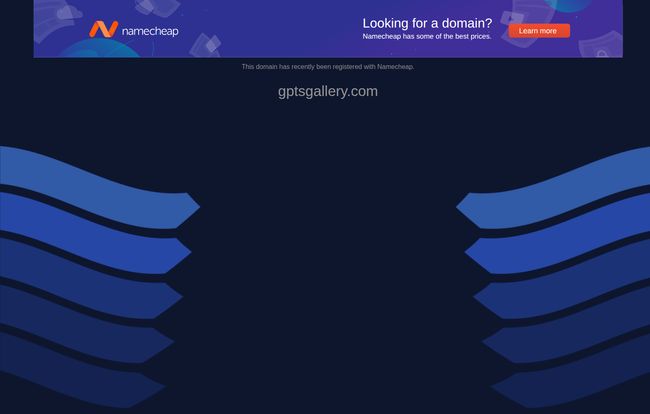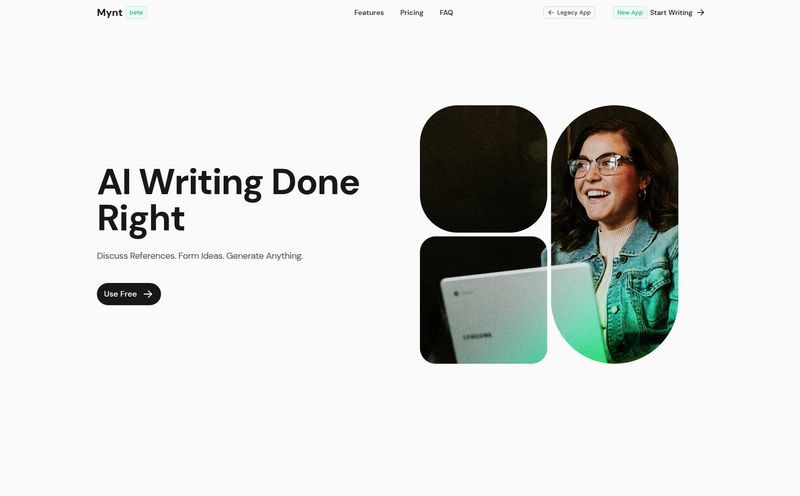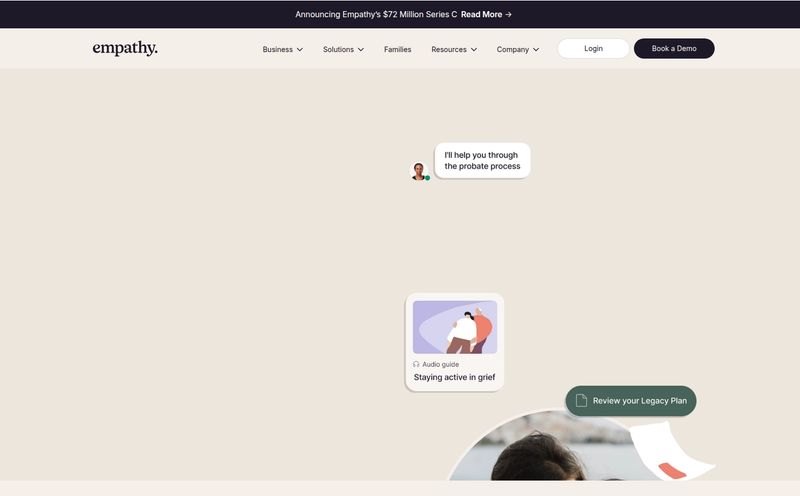If you’re anything like me, you’ve spent a fair bit of the last year riding the absolute rollercoaster that is generative AI. One minute you're creating stunning images with a simple prompt, the next you're arguing with a chatbot about the capital of Nebraska. It's a weird, wild, and wonderful time to be alive, and an even weirder time to be in SEO and digital marketing.
When OpenAI dropped the bombshell that we could all create our own custom GPTs, it felt like the floodgates opened. And they did. The official GPT Store is... well, it’s a lot. It's like a gigantic, sprawling digital flea market on a Saturday morning. You can find some absolute gems, but you’ve gotta sift through a mountain of half-baked ideas, abandoned projects, and a dozen nearly identical “marketing gurus” to find them. It's exhausting.
So, my ears perked up when I stumbled across a concept called GPTs Gallery. The name alone had me hooked. A gallery? Not a store, not a warehouse, but a gallery. That implies curation, taste, and a certain level of quality control. A place where someone with a good eye has already done the hard work of sorting the wheat from the chaff. The idea is simple but brilliant: a platform dedicated to showcasing the best, most innovative, and genuinely useful GPTs out there.

Visit GPTs Gallery
I rushed over to the domain, gptsgallery.com, with the excitement of a kid on Christmas morning, only to find... a parking page. Yup. A simple, blue “This domain has recently been registered with Namecheap” page. A digital ghost. The promise of a fantastic tool, but for now, just an empty lot where a beautiful building is supposed to be. But you know what? That almost makes it more interesting. It gives us a chance to talk about the why behind a tool like this before we get bogged down in the what.
The Custom GPT Gold Rush and the Discoverability Dilemma
Let's be real for a second. The ability to create custom GPTs is one of the coolest tech developments in recent memory. I’ve seen specialized GPTs for everything from helping a parent navigate the terrible twos, to offering stoic wisdom, to debugging Python code with terrifying accuracy. The potential is immense. But as the old saying goes, with great power comes a great big mess.
The problem isn’t a lack of tools; it’s a lack of a decent map. The official store feels like it prioritizes quantity over quality, and its search function can be a bit of a lottery. I’ve always felt that discoverability is the next great frontier for AI. We have the engines, but we need better dashboards and navigation systems. This is precisely the void a platform like GPTs Gallery aims to fill.
A Curated Collection, Not a Digital Free-for-All
The core promise of GPTs Gallery, based on the breadcrumbs of info out there, is curation. Instead of an algorithm throwing thousands of options at you, imagine a team of humans finding and featuring GPTs that actually work. The specs talk about categories like cooking, health, coding, and even parenting advice. This isn't just about finding a tool; it's about finding the right tool without wasting half your day.
It’s the difference between a thrift store and a boutique. Both can have great stuff, but one makes you work a lot harder for it. I, for one, am ready for the boutique experience. I want someone to tell me, “Hey, we tested 20 different recipe-generating GPTs, and this one is the only one that didn’t suggest putting pineapple on a hot dog.” That’s a service I can get behind.
More Than a List, It's an Ongoing Conversation
Another thing that caught my eye was the mention of a newsletter. This might seem like a small detail, but in the fast-paced world of AI, it’s a stroke of genius. A tool I used last week could be obsolete by tomorrow. A good newsletter that keeps you updated on the latest and greatest GPTs isn’t just marketing; it’s a vital lifeline for anyone trying to stay current.
It turns the platform from a static directory into a dynamic resource. It’s a way to keep learning and discovering how these weird little AI brains can make our work and lives a bit easier, or at least more interesting.
The Inevitable Downsides of a Walled Garden
Now, I’m a professional, which means I have to be a little bit cynical. No platform is perfect. A curated gallery, by its very nature, has limitations. You are entirely dependent on the tastes and criteria of the curators. What if their idea of a “great” coding assistant doesn’t match yours? You’re limited to what they choose to feature.
And then there's the effectiveness. GPTs Gallery doesn’t make the GPTs; it just points to them. If a featured tool is buggy, poorly designed, or just plain unhelpful, the gallery’s reputation takes a hit. Its quality is entirely dependent on the quality of third-party creators. It's a precarious position to be in, kind of like a movie critic who can only review films from one specific studio. Its a tough gig.
So Where Is It? And What’s the Price of Admission?
This brings us back to that lonely Namecheap landing page. The big question mark. The project is clearly in its infancy, or maybe it was just an idea someone had that was brilliant enough to secure a domain for. There's no info on pricing, which makes sense since there's no product yet.
Could it be free and ad-supported? Maybe a freemium model where you can browse but need to subscribe for premium picks or the newsletter? Or a one-time fee? Honestly, if the curation is as good as promised, I could see a small subscription being completely worth it. Time is money, and the time saved from not having to sift through junk has real value.
Some Alternatives While We Patiently Wait
Since we can't use GPTs Gallery just yet, it wouldn't be fair to leave you empty-handed. The community has, of course, tried to solve this problem on its own. There are a few other directories out there doing a pretty decent job.
I've played around with platforms like All Gpts and GPTs Hunter. They are essentially community-driven lists, often with voting systems, that help the best stuff rise to the top. They aren't quite the hand-curated, boutique experience that GPTs Gallery promises, but they are a massive step up from flying blind in the official store. They're a good place to start your treasure hunt.
Frequently Asked Questions About GPT Directories
- What is GPTs Gallery supposed to be?
- GPTs Gallery is conceptualized as a curated platform for discovering the best custom GPTs. Instead of an open marketplace, it would be a hand-picked collection of high-quality, innovative AI tools for various needs like cooking, coding, and creativity.
- Is GPTs Gallery a real, working website right now?
- As of late 2023/early 2024, no. The domain `gptsgallery.com` has been registered, but the site itself is not live. It remains an idea, a concept, or a project in very early development.
- Why is a curated GPT directory even necessary?
- The main reason is discoverability. The official GPT Store contains a massive number of custom GPTs, and it can be difficult and time-consuming to find high-quality, useful ones. A curated directory saves users time and effort by pre-vetting the tools.
- What are the potential downsides of a platform like GPTs Gallery?
- The two main potential issues are selection bias and dependency. Users are limited to what the curators choose to feature, and the platform's overall quality is entirely dependent on the effectiveness of the third-party GPTs it lists.
- Where can I find custom GPTs while waiting for new directories?
- Besides the official OpenAI GPT Store, you can check out community-driven directories like All Gpts or GPTs Hunter. Searching on social platforms like X (formerly Twitter) or Reddit can also surface interesting finds from creators.
- Will GPTs Gallery be a free service?
- There's no information on pricing yet. A tool like this could potentially be free and ad-supported, or it might operate on a freemium or subscription model to cover the costs of curation and maintenance.
Final Thoughts on an Idea Worth Waiting For
So, GPTs Gallery is currently more of a myth than a reality. A whisper of a great idea. But it’s a myth that speaks to a very real need in the AI community. We've moved past the initial shock and awe of generative AI and are now entering a more mature phase—one where usability, quality, and curation matter more than ever.
We don’t just need more tools; we need better ways to find and use the amazing tools that already exist. Whether GPTs Gallery is the platform that ultimately solves this problem or not, it represents a step in the right direction. It’s a sign that the market is maturing.
And hey, to the person who registered `gptsgallery.com`: if you’re reading this, please hurry up. We’re all out here, waiting for the gallery to open.
Reference and Sources
For those looking for current, working GPT directories, here are the ones mentioned in the article:



